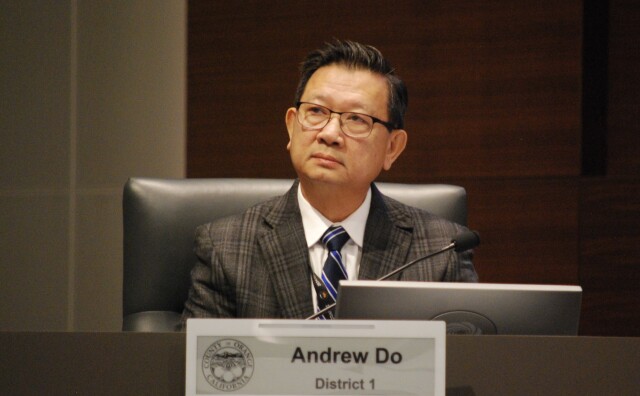When California joined the United States in 1850, the state banned forced labor with one key exception: as punishment for a crime.
The Legislative Analyst’s Office estimates that about one-third of people incarcerated in state prisons work. They do jobs that keep the jails running — like cooking and cleaning. They also help fight wildfires by cutting firelines and trimming vegetation. "People who refuse to work or do other activities can face consequences such as losing the ability to make regular phone calls," according to the Legislative Analyst's Office.
According to the office, many people doing work inside state prisons earn less than $1 per hour.
California Proposition 6 would ban state prisons from forcing incarcerated people to work against their will.
Make It Make Sense: Election 2024 Edition
Official title on the ballot: Proposition 6 — Eliminates Constitutional Provision Allowing Involuntary Servitude for Incarcerated Persons. Legislative Constitutional Amendment.
-
According to the California Legislative Analyst's Office ...
A "yes" vote means: Involuntary servitude would not be allowed as punishment for crime. State prisons would not be allowed to discipline people in prison who refuse to work.
-
A "no" vote means: Involuntary servitude would continue to be allowed as punishment for crime.
-
City of Los Angeles
- City Council: Vote for districts 2, 10 and 14.
- Charter Amendment ER: A package of ethics reforms designed to fight corruption at City Hall. Plus: Charter Amendments DD, FF, HH and II.
L.A. County
- Board of Supervisors: Measure G would dramatically overhaul county government.
- District Attorney: Criminal justice reform, or more law-and-order justice?
- LA Unified school board: Voters are also deciding on a $9 billion facilities bond and a redistricting measure.
- School district measures: Schools have a lot of repair needs.
- Superior Court judges: Plus: Tips to make sure you're putting right person on the bench.
Statewide races
- Whoa! There are 10 propositions on the ballot. Here's your cheat sheet to Props. 2, 3, 4, 5, 6, 32, 33, 34, 35 and 36.
Jump to the full Voter Game Plan for dozens more races ▶
Understanding Prop. 6
The measure aims to change the state constitution to prohibit involuntary servitude as a punishment for a crime. Prop. 6 also would prohibit state authorities from punishing incarcerated people who decline to work. It would allow incarcerated people to work to earn so-called good-time credits, which could reduce the amount of time they serve behind bars.
The history behind it
Prop. 6 is one of 14 bills that were prioritized by the California Legislative Black Caucus as part of its reparations package — all aimed at recognizing the need to right the wrongs done to Black Californians, especially those who are descendants of enslaved people.
The recommendation to end forced labor in California prisons comes out of the California Reparations Task Force. Assemblymember Lori Wilson, chair of the California Legislative Black Caucus, called for “a comprehensive approach to dismantling the legacy of slavery and systemic racism.” And Prop. 6 is seen as part of that dismantling.
Cram session
During AirTalk's Ballot Cram Session live event, Larry Mantle talked with Caltech's Michael Alvarez, Pomona College's Sara Sadhwani and Claremont McKenna College's Zachary Courser about Proposition 6.
How it would work
The proposition would ban state prisons from forcing incarcerated people to work against their will.
How much would it cost?
The Legislative Analyst's Office said it’s unclear how much Prop. 6 would cost the criminal justice system. That’s because the state could end up paying people more in order to encourage them to work, increasing costs. But the state could also encourage people to work by offering more time credits, which might reduce overall prison costs.
Either way, the cost would likely “not exceed the tens of millions of dollars each year,” the Legislative Analyst’s Office said.
A similar measure failed to reach the ballot in 2022, in part because the California Department of Finance opposed it, saying the plan could cost $1.5 billion if incarcerated people were paid minimum wage.
Who supports Prop. 6?
- ACLU California Action
- Anti-Recidivism Coalition
- California Democratic Party
- California Teachers Association
- California Black Legislative Caucus
Who opposes Prop. 6?
There are no registered opponents to Prop. 6 but some Republican lawmakers voted against it.
Follow the money
Listen in: AirTalk tackles Prop. 6
Before you read more, we wanted to take a moment to tell you about our mission here at LAist, and why we're so dedicated to helping you get ready to vote.
In the lead-up to this important election, our hard-working reporters and editors spent hundreds and hundreds of hours researching and writing these detailed guides and fact-based resources. We invested that time because we're here to help you vote confidently and make your community a better place.
But we cannot do this essential work without your help. We rely on donations from readers like you to stay independent, which keeps our nonprofit newsroom strong and accountable to you.
At a time when the need for local journalism has never been greater, many newsrooms are facing cutbacks, including LAist. Member support — your support — is what will sustain a free press in Southern California.
LAist’s mission is to be here for you, so please be here for us now with a donation to power our trusted local reporting. Step up right now and make the choice to give. Because that’s exactly what it is — a choice. It's choice with consequences. If readers do not choose to step up and donate, the future of fact-based news in Southern California will not be as strong.
No matter what happens in the world, LAist will remain a voice you know and trust.
Thank you for your generous support.
Sincerely,
-
(she/her)

This voter guide originally published Aug. 28.








